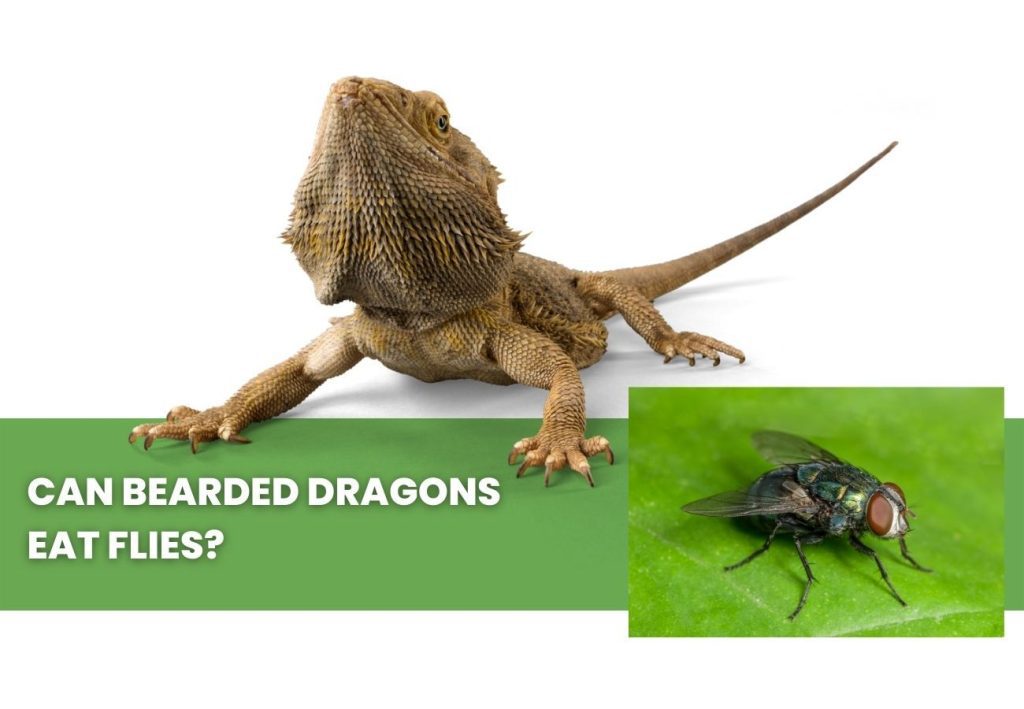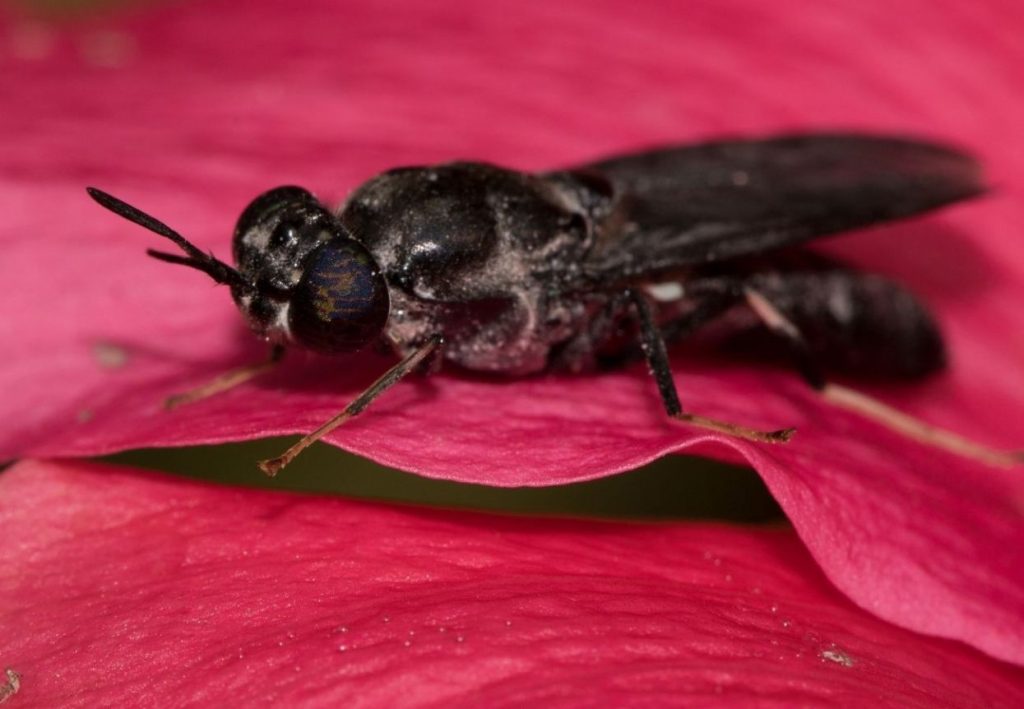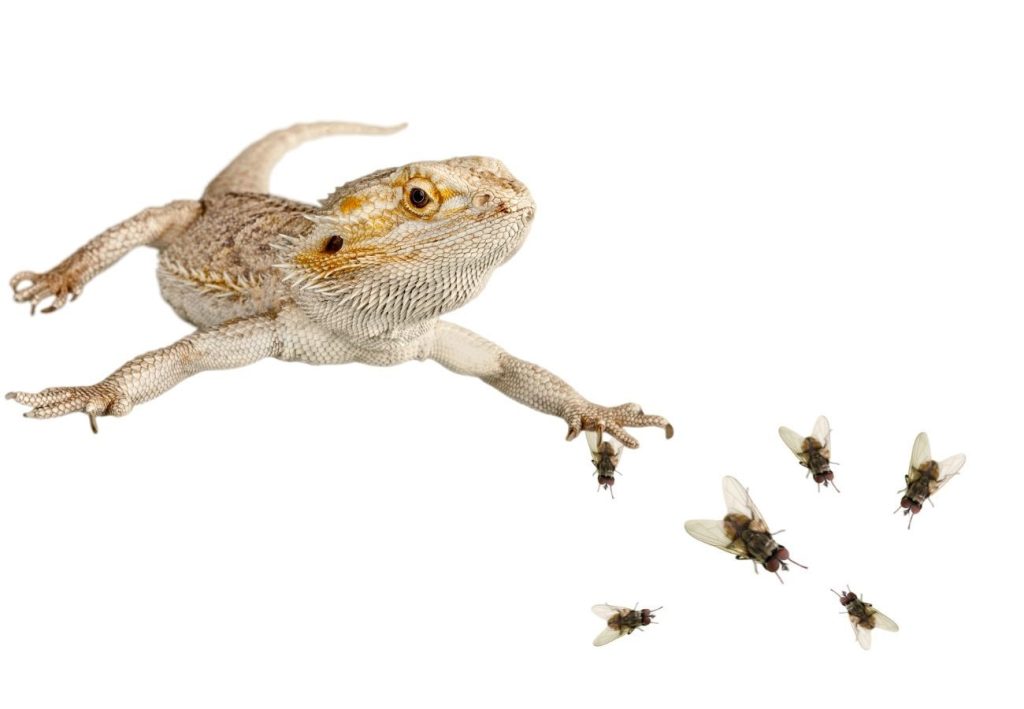
Flies As A Food For Bearded Dragons: Cool Beans Or Not?
Bearded dragons can eat flies, but not all flies are safe for your bearded dragon.
Most fly species are either carriers of disease-causing bacteria or harmful to crops and animals.
This article is about suitable flies to feed your bearded dragons, the best way to feed them, and the benefits, dangers, and nutritional value of these suitable flies.
WHAT KINDS OF FLIES ARE GOOD FOR YOUR BEARDIES?
The black soldier fly (Hermetia illucens) is one nutritious fly your bearded dragon can eat.
Although bearded dragons can eat any flies, including houseflies, and fruit flies, a great diet choice, they lack adequate nutrition that your bearded dragons need. Except for Black Soldier flies and Fruit flies, most flies are scavengers that eat spoiled food. Thus, they carry disease-causing bacteria that poses health risks to humans and your pet.
Can Bearded Dragons Eat Black Soldier Fly Larvae?
The black soldier fly is most nutritious during the larva stage. Known as Calci-worms at this stage, they provide high calcium compared to other insects (even in their adult form).
Bearded dragons are notorious for quickly putting on weight. Feed less black soldiers fly larvae to adult bearded dragons so they do not get fat. Feed more larvae to the baby and smaller bearded dragons to satisfy their calcium needs.
Also, the small size of the black soldier fly larvae makes them an ideal choice for a baby bearded dragon’s diet.
WHERE TO GET FLIES FOR YOUR BEARDED DRAGON
Black soldier flies and their larvae (maggots) can be bought from a local pet store. They will usually breed their black soldier flies in a clean and controlled environment, making them safe to feed your bearded dragon.
Do not feed your pet wild flies, as they can carry bacteria and parasites that cause sickness.
Buy only Black Soldier flies or Fruit flies. Other flies offer very little or no additional nutrients for your beardies.
NUTRITIONAL VALUE OF BLACK SOLDIER FLY LARVAE
As the most nutritious fly you can feed your bearded dragon, let’s take a look at some of the nutrition values of the black soldier fly larvae.
| Nutritional Item | Content |
| Moisture (%) | 61.2 |
| Fat (%) | 14.0 |
| Protein (%) | 17.5 |
| Ash (%) | 3.5 |
| Calcium (mg/kg) | 9340 (0.93%) |
| Phosphorus (mg/kg) | 3560 (0.36%) |
| Fiber (%) | 3 |
BENEFITS OF FEEDING BLACK SOLDIER FLY LARVAE TO YOUR BEARDED DRAGONS

High Moisture Content
Bearded dragons’ bodies are 65% water, so moisture intake is not an issue.
Calcium at Its Peak
Bearded dragons need calcium to ensure proper bone development. Feeding them black soldier flies works faster than calcium powder. It is also a natural calcium source
Low Chitin
Bearded dragons cannot digest chitin from crickets and other insects. It may cause your bearded dragons to suffer an impaction (an accumulation of fecal matter that gets stuck in the colon and can’t be discharged). But these flies are almost chitin-free, making them perfect for your beardies to eat.
DANGERS OF FLIES TO BEARDED DRAGONS

Here are some risks of feeding your dragon pet flies.
Disease Carriers
Flies carry different diseases. House flies, for instance, feast on rotten animal flesh and other spoiled matter. It is, thus, no surprise that they carry gastroenteritis, salmonellosis, and other types of bacteria.
Buy only black soldier flies or fruit flies to avoid this danger. They are neither carriers of diseases nor pests and are more nutritious than other flies.
Reduced Nutritional Quality
Although a mature housefly consists of about 1.97 grams of protein, it does not compensate for other nutrients your bearded dragon needs which puts your beardies at risk of malnutrition.
You can avoid this danger by choosing the right flies such as black soldier flies and fruit flies.
HOW OFTEN SHOULD BEARDED DRAGONS EAT FLIES?
It would be best to feed your pet black soldier fly larvae every day. The flies will serve as a natural source of calcium to build strong bones.
Feed these flies regularly to your adult bearded dragon. But note that they may become irritated because of the fly’s size and get agitated. So, be creative with the food assortment.
FINAL THOUGHTS
The black soldier fly larvae and fruit flies are the best options for feeding your pet. Mix them with other foods like mealworms to make them more appealing to your bearded dragon. And most importantly, avoid wild flies!
Continue to read our main article “What do Bearded Dragons Eat?” for all the ins and outs on general diet questions, and get a further detailed breakdown of other popular foods in the articles below:
- Can Bearded Dragons eat tomatoes?
- Can Bearded Dragons eat oranges?
- Can Bearded Dragons eat parsley?
- Can Bearded Dragons eat blackberries?
- Can Bearded Dragons eat pumpkin?
- Can Bearded Dragons eat pineapple?
- Can Bearded Dragons eat cantaloupe?
- Can Bearded Dragons eat green beans?
- Can Bearded Dragons eat cherries?
- Can Bearded Dragons eat asparagus?
- Can Bearded Dragons eat mango?
- Can Bearded Dragons eat cauliflower?
- Can Bearded Dragons eat avocado?
- Can Bearded Dragons eat brussel-sprouts?
- Can Bearded Dragons eat collard-greens?
- Can Bearded Dragons eat wax-worms?
- Can Bearded Dragons eat dandelions?
- Can Bearded Dragons eat nightcrawlers?
- Can Bearded Dragons eat earthworms?
- Can Bearded Dragons eat eggs?
- Can Bearded Dragons eat basil?
- Can Bearded Dragons eat peaches?
- Can Bearded Dragons eat grasshoppers?
- Can Bearded Dragons eat sweet potato?
- Can Bearded Dragons eat hornworms?
- Can Bearded Dragons eat Mice?
- Can Bearded Dragons eat Cucumbers?
- Can Bearded Dragons eat Cabbage?
- Can Bearded Dragons eat Kale?
- Can Bearded Dragons eat Bell Peppers?
- Can Bearded Dragons eat Broccoli?
- Can Bearded Dragons eat Meat?
- Can Bearded Dragons Eat Green Onions?
- Can Bearded Dragons Eat Ants?
- Can Bearded Dragons Eat Mint?
- Can Bearded Dragons Eat Mustard Greens?
- Can Bearded Dragons Eat Radichio?
- Can Bearded Dragons Eat Squash?
